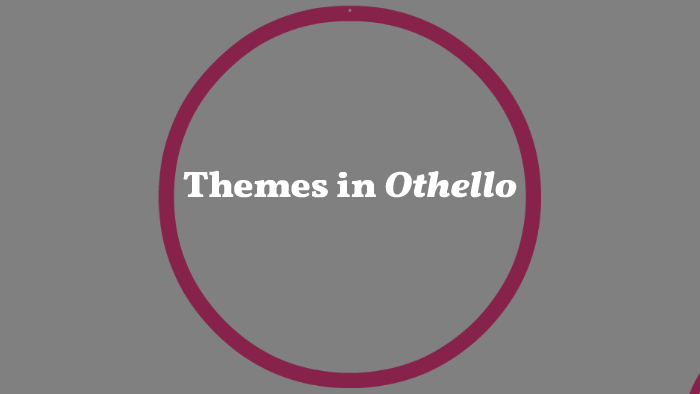
Shall out-tongue his complaints ’tis yet to know – My services, which I have done the signiory, At the beginning of the play, Othello is confident, and he knows he deserves Desdemona. Othello that the audience sees on the stage for the first time is not the same Othello that kills Desdemona. When Othello goes to the Senate to defend himself and his marriage in front of the Duke, it is not his love that helps him save the situation but Othello’s important and influential status in Venice.
#Themes in othello skin#
Iago does not mention Othello’s name and calls him “the Moor” to reduce Othello to his skin color. He always targets Othello’s skin color and Othello’s cultural identity. It is interesting that Iago never questions Othello’s ability as a leader or a soldier.

Throughout the play, Iago purposefully places “blackness” in opposition with “whiteness.” He even influences other characters to approach this matter in a similar manner, including Othello himself. For instance, the Duke says that Othello is “far more fair than black,” implying that being “fair” is more desirable than being black and that an educated black man loses his blackness and transcends the race. There are other characters that, without an intention to offend, express hidden racism not towards Othello per se but towards black people in general. She states that she is “color-blind,” which is, in fact, a subtle form of racism.īack to the Top “Blackness”/ “Whiteness” Opposition She has to justify to the audience why and how she was able to overcome Othello’s blackness. She says, “I saw Othello’s visage in his mind.” Here she accepts that her love for him is alienated from his appearance. He even thinks that Othello used some witchcraft to attract Desdemona because, otherwise, it would be impossible or unnatural for a fine white lady to fall in love with “the Moor.”ĭesdemona loves Othello, but she makes some racially insensitive comments as well. He invites Othello to his house, he respects him as a soldier, but Barbantio can’t imagine Othello as his son-in-law.


Barbantio, Desdemona’s father, is Othello’s long-term friend, but he strongly opposes this marriage. This scene, at the very beginning of the play, is penetrated with racial commentaries. The Elizabethan audience was not prepared even to imagine an interracial couple, but because Iago is such a malicious character, the audience is on Othello’s side. In these first lines, which produce an immense effect on the audience, Othello is being called “the Moor,” “the thick lips,” “a lascivious Moor,” and “an old black ram.” Iago tells Barbantio: The three characters express race prejudice towards Othello and offer a sneak peek of how race relations in Elizabethan England looked like.


 0 kommentar(er)
0 kommentar(er)
